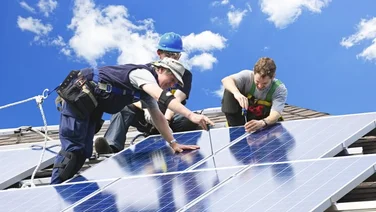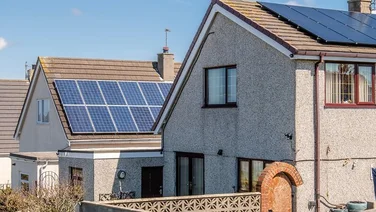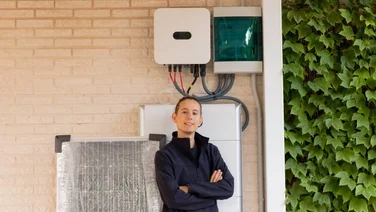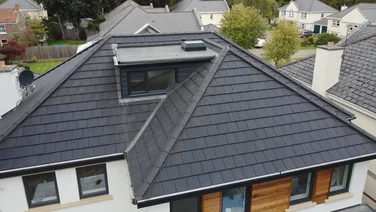Solar ovens use sunlight to cook food without the need for fuel or electricity
The three main types are box, panel, and parabolic solar ovens
Solar ovens cost between £100 and £300, on average
Solar ovens are not a new technology, but they have become popular among outdoor enthusiasts as a way to cook food on campsites, or even in the garden.
Theyre also commonly used in rural communities in China and India, which dont always have access to reliable sources of fuel or electricity for cooking.
Well go over exactly what solar ovens are, how they work, and what you can cook in them in this article. Well also assess their pros and cons, and talk about how much they cost.

What is a solar oven?
A solar oven, also known as a solar cooker, is a device that concentrates sunlight to generate heat, which it uses to cook food or heat liquids without the use of fuel or electricity.
Often used for camping, most solar ovens are relatively easy to transport and set up. You can also make DIY versions using cardboard boxes, aluminium, and plexiglass.
How does a solar oven work?
Solar ovens work by focusing the suns thermal energy. They concentrate sunlight, using mirrored or reflective surfaces, into one single spot where a cooking pot is.
When the ultraviolet rays of the sun hit the dark surface of a cooking pot or other receptacle containing food, theyre converted into infrared radiation meaning heat.
Glass or other clear materials are used as a lid either for the pot or the reflective box of the solar oven to trap the heat. The more heat is generated, the hotter the inside of the solar oven or cooking pot becomes.
This process is also the reason the inside of a car gets hot when its left parked outside on a sunny day.
The best place to put a solar oven is under direct sunlight in short, outside.
You could potentially cook food with a solar oven from your window or balcony. But if you do this, its best to choose one thats south-facing, as this will expose your oven to the most sunlight.
Cooking food when the sun is highest in the sky between 11 am and 3 pm in the UK will also increase your chances of successfully cooking.
It takes between one and four hours to cook food in a solar oven.
Cooking times will vary depending on the type of solar oven you use, the type of food being cooked, how high the sun is in the sky, and how warm it is outside.
Do solar ovens work in the UK?
Solar ovens do work in the UK, but theyre dependent on weather conditions.
For a solar oven to work well, it needs to be sunny out, although they can sometimes work under light clouds.
As we know, sun can be in short supply in the UK, so if youre planning on using a solar oven on your next camping trip, its best to check the forecast.
Solar ovens also work at temperatures as low as 0°C, so you dont need to wait for a heatwave to use one in the UK.
However, solar ovens do work better when its hot out, since they dont need to build up as much heat, and they dont lose warmth as quickly as they do in colder weather.
What type of food can you cook in a solar oven?
You can cook almost any type of food in a solar oven.
That being said, it might be difficult to grill food such as bacon and eggs in a solar oven, or to cook pasta. Thats because boiling water or grilling food requires a higher temperature than most solar ovens can create. Some types of solar ovens can do this, but theyre expensive and not as common.
This doesnt mean you cant cook eggs or bacon using a typical solar oven; they just wont be crispy.
In general, solar ovens work best with meals that are slightly wet and can be cooked in one pot. This includes stews, baked beans, shakshuka, and rice dishes. They can even be used to bake desserts, such as cakes or biscuits.
Types of solar oven
The three main types of solar ovens are box solar ovens, panel solar ovens, and parabolic solar ovens.
Box solar ovens are, as the name suggests, in the shape of a box. They typically have an interior thats lined with a reflective material, and a clear lid that can be opened and closed.
Theyre well insulated, and can get as hot as 150°C. Plus, if theyre large enough, multiple cooking pots can be placed inside them to cook food.

Box solar oven
Panel solar ovens are made of reflective panels. One panel serves as a base, and the others form a closed square or hexagon. The cooking pot is placed in the middle of the panels, on the base.
This type of solar oven is lightweight, so its ideal for use on the go. But panel solar ovens arent as well-insulated as box solar ovens, so they dont get quite as hot. Theyre best for foods with short cooking times.

Panel solar oven
Parabolic solar ovens are typically round, and have a slightly concave shape. As with other solar ovens, their inner part is lined with a reflective material. Parabolic solar ovens have a pole that sticks up through their centre, which has a platform on the end, where the cooking pot can be placed.
Their shape allows for a lot of solar energy to be concentrated onto a single spot: the platform where the cooking pot is placed. This means theyre able to heat pots to very high temperatures up to 200°C in some cases and can be used for grilling foods or heating water.
The caveat is theyre relatively wide, and so can be difficult to transport. They also need to be re-directed as the position of the sun changes.

Parabolic solar oven
The pros and cons of solar ovens
- Emissions-free cooking
- Good backup for camping emergencies
- No running costs
- Can be a DIY project
- Dependent on weather conditions
- Some models are quite bulky
- Some models can be expensive
- Not always as hot as other types of on-the-go cooking technology
Advantages of solar ovens
One key advantage of solar ovens is that they offer emissions-free cooking. They arent powered by fossil fuels, unlike gas stoves, and they dont require electricity, not all of which is generated sustainably.
Because solar ovens are powered by the sun, theyre also a good backup if you run out of power from your generator when camping or if you just want to preserve power for things such as charging phones.
Plus, since solar ovens require zero fuel or electricity, theyre completely free to run fuel and electricity (unless it comes from a portable solar panel) cost money.
You dont need to spend money on a solar oven either; you can actually make DIY versions with materials you have at home. One way to do this is with an old cardboard box, lined with aluminium, and a glass or plastic sheet.
Disadvantages of solar ovens
The main disadvantage of solar ovens is that theyre dependent on the weather. Solar ovens dont work in rainy, or heavily overcast conditions, or at night. This means they wont work if the conditions arent optimal.
Some solar ovens, especially parabolic solar ovens, can also be bulky. This means they arent ideal to take with you on a hike, and they take up room in the car if youre driving somewhere to camp.
Price can also be an issue. Some fancier parabolic solar cookers can cost over £1,000 far more than what youd pay for a hot plate.
Lastly, the cheapest and most accessible types of solar ovens box and panel ovens dont get quite as hot as regular ovens, or some hot plates. This means theres a limit to the kind of dishes you can make using them, and cooking times might be long.
How much does a solar oven cost?
On average, you can get a decent solar oven for between £100 and £300.
Solar ovens can cost as little as £50 for foldaway box type ovens, and as much as £1,500 for large parabolic ovens.
Box and panel solar ovens are the cheapest type, while parabolic solar ovens are more expensive, usually costing at least £400.
Do solar ovens require much maintenance?
Solar ovens do not require much maintenance. The main thing you need to do is keep them clean.
This is especially important when it comes to the reflective or glass surfaces of the solar oven. Dust or grime build-up can hinder the solar ovens ability to reflect and concentrate sunlight, so be sure to keep those surfaces clean.
Solar ovens can be cleaned with a damp soft cloth, and a little detergent if needed. Just make sure to remove any soap residue after cleaning, and buff the surfaces with a dry cloth to keep them shiny.
Summary
Solar ovens are an eco-friendly way to cook food outside. They also have no running costs, since they rely on the suns energy.
If youre interested in limiting your environmental impact, then investing in a solar oven for your next camping trip, or just to use in your garden in the summer, is a good choice.
Solar ovens are also a great option for off-grid living, since theyll reduce your reliance on gas or electricity powered hobs and stoves.
For more ways to reduce your environmental impact, check out our tips for eco-friendly living.







